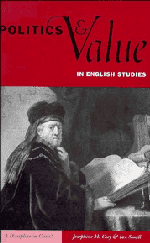1 - Preliminaries
Published online by Cambridge University Press: 27 January 2010
Summary
Today it is virtually impossible for practising critics not to be aware of some need to ‘justify’ what they do – to ‘theorize’ their practices. Indeed theory has now become a subject in its own right in English studies, with its own undergraduate courses, postgraduate degrees, text-books and so on. The rapid growth of the ‘theory industry’, however, has not passed unnoticed or unchallenged; along with the enthusiasm for this new theoretical abundance there has in recent years been something of a countervailing movement. United by a general feeling of dissatisfaction rather than by any particular thesis, an increasing number of critics have been calling for a halt or, at the very least, a pause to take stock of the current situation. In their view the popularity and growth of the theory industry, far from reinvigorating the discipline, have led to what they see as a ‘crisis’ in which the ‘traditional’ conception of English seems on the point of disappearance.
Within this countervailing movement it is possible to identify two groups. On the one hand there are those critics who, while accepting the value and necessity of explicit theorizing, have nevertheless voiced some reservations about the ways in which theory is currently used in English studies. In particular they have pointed to the vexed relationship which now obtains between theory and pedagogy, and have suggested that there might be some important and (as yet) unresolved issues concerning the relationship between theory and practice in the discipline. On the other hand there is a lobby which may be broadly characterized as ‘anti-theory’, although a distinction needs to be made between two positions within it.
- Type
- Chapter
- Information
- Politics and Value in English StudiesA Discipline in Crisis?, pp. 8 - 28Publisher: Cambridge University PressPrint publication year: 1993

